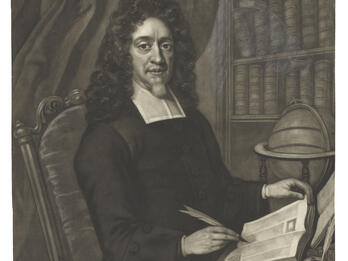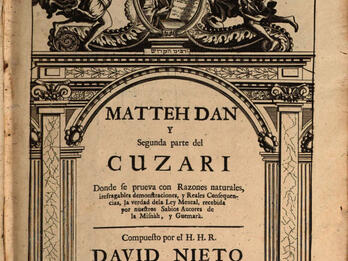Apirion ‘asah lo ([Solomon] Made Himself a Palanquin)
The Second Column
It Is Pertinent to Ask, by Way of Reasoned Inquiry, What Need Brought Him Who Gave the Torah to Give Some of It Revealed and Some of It Concealed
When we continue with this matter of the giving of [the Oral] Torah up until the time of R. Judah the Prince, the idea is that there was no permission given to record these matters in a book until the time that it was absolutely necessary to cross the boundary and the custom, because it was a time to act for the Lord (Psalms 119:126). If they should say that it is because secrets are only given to those who are modest, then the question is: is not the Written Torah, which was given publicly and explicitly, above the Oral Torah? On the contrary, since the matter affects all the people of Israel, including kings, priests and simple people, wise men and those who are ignorant, many young males and females, the male slave and the female slave, and the proselyte, then it should be imperative for it to be exposed and in writing, and not oral. The divine Torah is not of the type of wisdom that is customary among many people, which, when they attain it in some possible manner, they conceal and retain it under their tongues due to their jealousy of others. This is by way of the verse: let them be only your own, and not of the strangers who are with you (Proverbs 5:17).
This is not the will of the creator of the world, as is known, in that each and every commandment decreed in faithfulness to the house of Moses our teacher, may peace be upon him, has come with the following type of language: “Speak to the children of Israel,” or “to the whole community of the children of Israel,” or to certain specific people, such as: “Speak to Aaron and to his sons.”1 For God is the source of all wisdom and understanding, and He does not hold back anything from His infinite comprehension. On the contrary, out of His goodness, He influences His creatures to attain perfection, each according to its natural disposition. And since everything is examined by way of its four causes, and they explained the first three causes, which are the material, the formal, and the efficient, they will tell us about the fourth cause, which is the final cause, then for what final cause would this matter of orality be? For most of the laws of halakhah were delivered orally and only very few in writing.
And what was the advantage of concealing things and transmitting them orally, a father to his son, and a rabbi to his student? And in contradistinction to this, what is the damage now, when these things are written in manuscripts by a tribe of scribes? Would it not have been more proper for them to have been written at the time of the prophets? There would then not have been any doubt concerning that which was written at the time of the amoraim [sages of the Mishnah and Talmud]. Moreover, there is absolutely no proof from the Torah concerning oral transmission; rather, there are multiple proofs for the opposite, such as that which is written in the Mishpatim reading, in which God speaks about the Torah and the commandments that I have written, that you may teach them (Exodus 24:12) as we have mentioned in the introduction. Another proof is that which is written in Deuteronomy [1:5]: Moses began to clarify this Torah; this refers to the written Torah, some of whose commandments, which were declared in its first four books, were again mentioned in the fifth book. And Moses clarified some of them, such as that which is said in the Kedoshim reading: a mingled garment of diverse kinds, etc. (Leviticus 19:19). It was not known which types of fabric were referred to as mingled until Ki tetse [Deuteronomy 22:11] clarified that it refers to “wool and linen.” The word clarify does not refer to the oral Torah, according to the opinion of the talmudic scholars. And the proof of this is that Moses’ speech was with the entire people of Israel and not with the select few, or with his student Joshua.
After he proved and made known to the people the unfolding of these matters for the entire time that they were in the desert, when he began to warn them concerning the keeping of the Written Torah and the upholding of its commandments, he immediately began with a second verse and said: You shall not add to the word which I command you, neither shall you diminish from it (Deuteronomy 4:2) It is written thus in several places, and in the Eikev reading it is written: And it came to pass at the end of forty days and forty nights, that the Lord gave me the two tablets of stone, etc. (Deuteronomy 9:11). Behold, at the end of forty days, He did not give anything other than the Written Torah, and it was not, as the talmudic scholars maintain, that after forty days, He gave the Oral Torah. And indeed, R. Baḥya wrote in his book, concerning the verse But as for you, stand here by Me (Deuteronomy 5:28):
You should learn concerning the language of the verse, But as for you, stand here by Me, and I will speak to you all the commandments, and the statutes, and the judgments. It mentioned the language of “speech” in the word speak, which is the Written Torah, the prophecy of Moses our teacher, may peace be upon him; and this is the reason why it mentioned to you. And with the attainment of Israel it mentioned the phrase the Lord your God is with you (Deuteronomy 5:29), which is language of observance. Thus, it is written: You shall observe to do as the Lord your God has commanded you (Deuteronomy 5:28). For you have heard the speeches from His mouth at Sinai; understand this.
Indeed, in the Vayelekh reading, it is written: And Moses wrote this Torah, and gave it to the priests, etc. (Deuteronomy 31:9). It is also written: And it came to pass, when Moses had made an end of writing the words of this Torah in a book, until they were finished (Deuteronomy 31:24). The words until they were finished teach that there will not be any other Torah. This is like the matter of what is written: The Torah of the Lord is perfect (Psalms 19:8). And the verse concerning the Torah: that it may be there as a witness for you, teaches, concerning its existence, that it should not be exchanged for anything more or anything less, for it is the axis and the center. All interpretations come out from it and return to it, like the image of radii that come out from the center to the circumference of a circle. And that which he said at the end of Vayelekh: For I know that you will surely become corrupted and turn aside from the way which I have commanded you (Deuteronomy 31:29), hints at the corrupted instructions that come in place of the Scripture, which are the commentaries that do not relate to the simple meaning of the Bible.
Translated by
.
Notes
[Exodus 14:2; Exodus 16:10; Numbers 6:18.—Trans.]
Credits
Solomon Troki, “Apirion ‘asah lo ([Solomon] Made Himself a Palanquin)” (Manuscript, Riga, ca. 1700). Published as: Shelomoh ben Yedidyah Aharon ha-troki, “Is it Pertinent to Ask, by Way of Reasoned Inquiry, What Need Brought Him Who Gave the Torah to Give Some of It Revealed and Some of It Concealed (Hebrew)” in Sefer Apiryon ʻasah lo, ed. Yosef ben ʻOvadyah Algamil, vol. 2 (Ramlah: Mekhon “Tif’eret Yosef” le-ḥeker ha-Yahadut ha-kara’it, 1999), 383–388 (Second Column).
Published in: The Posen Library of Jewish Culture and Civilization, vol. 5.





